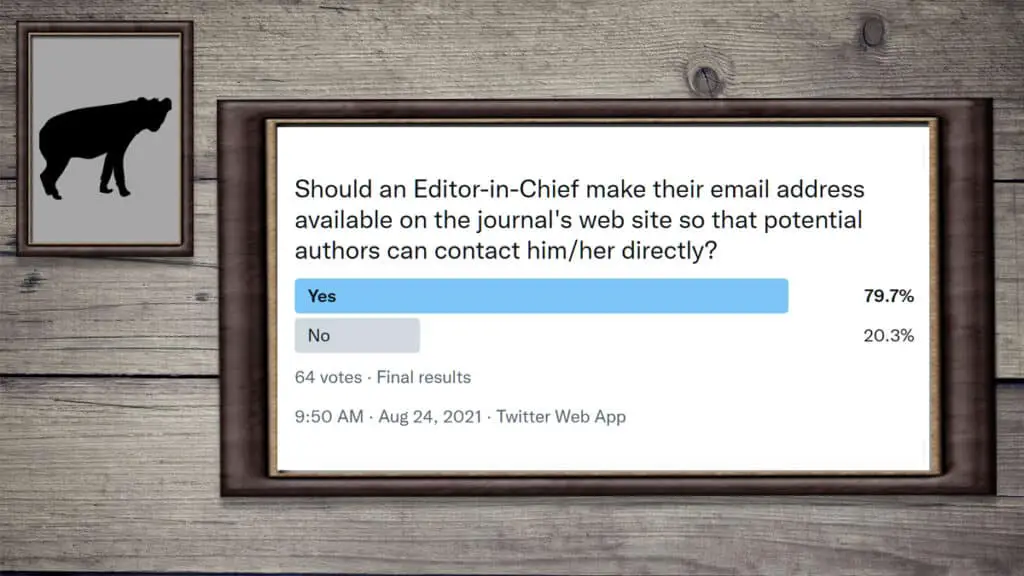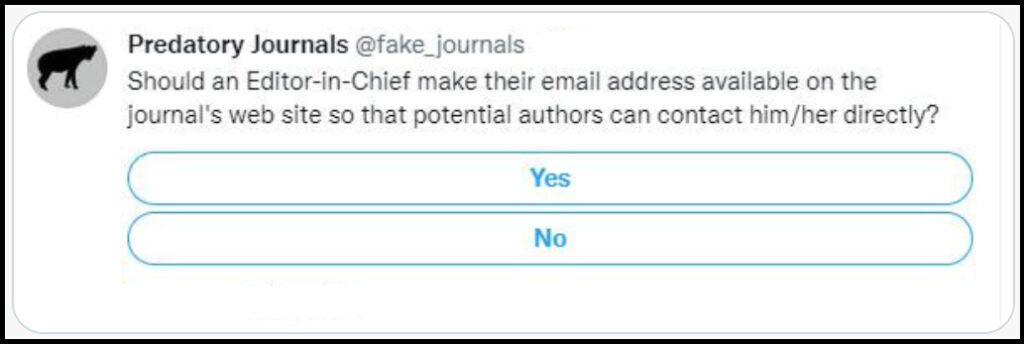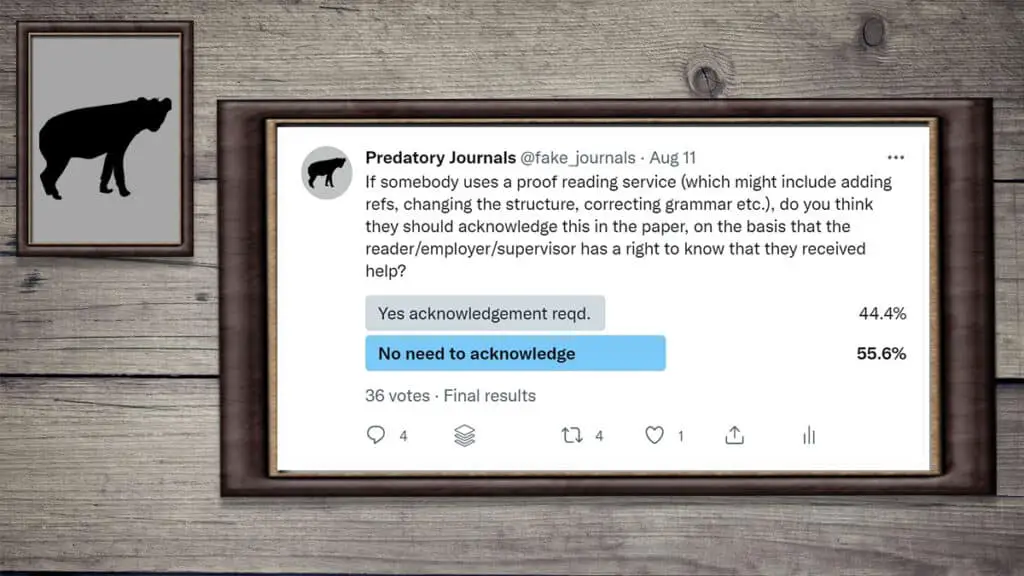One indicator of whether a journal is predatory or not is to check the editorial board. This might include checking whether any editors are actually listed, whether those that are listed actually know they are listed, whether the editors contact details/affiliation are mentioned and whether the editors can be contacted.
In this article we focus on one aspect of the editorial board, the editor-in-chief (EiC), and ask whether an EiC should make their email address available?
To get the view of others, we carried out a Twitter survey. In this article we give the results of that survey, as well as give your our view which we only do now, after the survey has closed.
We should emphasize that the editorial board is just one indicator of a possible predatory journal and it is far from definitive, especially if looked at in isolation. The editorial board information has to be considered alongside other indicators before an informed decision can be reached whether a journal is predatory or not.
Where are these checklists?
We mentioned that the editorial board is just one indicator, suggesting that there are others. In fact, there are many, such as time taken to review the paper, the journal sending spam emails to solicit papers, the quality of the journal’s web site and whether the journal claims that it is indexed, when it is not, or the indexing service itself is questionable.
There are several papers that provide checklists for ascertaining whether a journal is predatory or not. We have recently seen this one by Cukier et al. 2020 (see Figure 1). Table 1 in that paper lists 53 checklists to guard against predatory publishing.
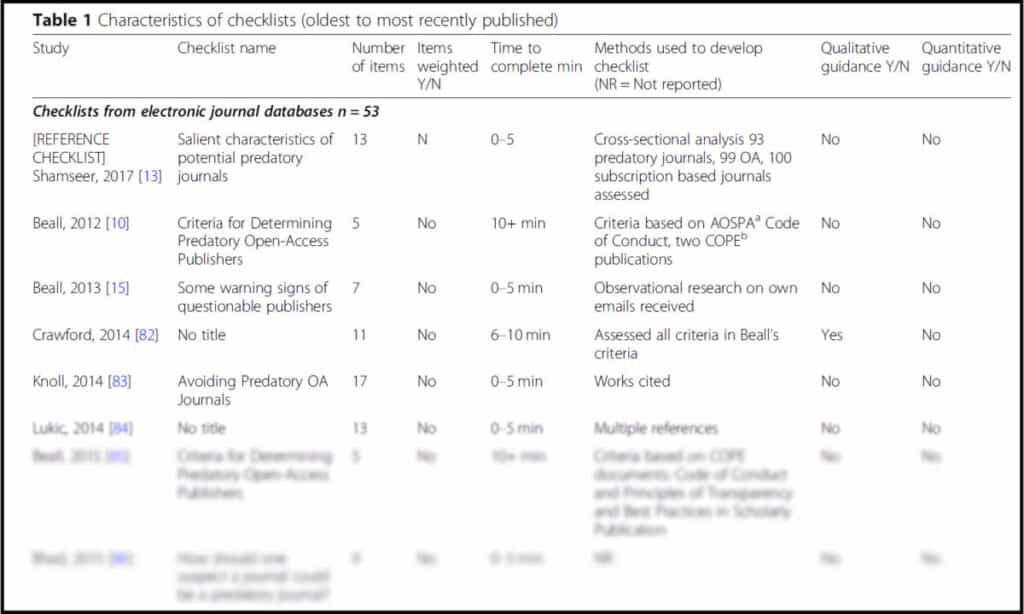
The full paper, which is open access, is available here – https://dx.doi.org/10.1186/s12916-020-01566-1.
We will not go into any further details in this article, as that is not its focus.
The survey details
We recently ran a Twitter survey, which focused on a very specific question, with regard to editorial board members. We asked:
“Should an Editor-in-Chief make their email address available on the journal’s web site so that potential authors can contact him/her directly?“
Figure 2 shows the survey question as it appeared on Twitter.
The survey ran for seven days from about 17 August 2021 to the 24 August 2021.
We promoted the survey by pinning it to our profile and also by trying to alert various Twitter users that we thought that they might like to either participate in the survey and/or promote it by liking it/retweeting it.
The Survey Results
Figure 3 shows the results of the survey.
The survey attracted 64 votes, with 79.7% (51 votes) saying that EiC’s should provide an email address. 20.3% (13 votes) said that it was not necessary.
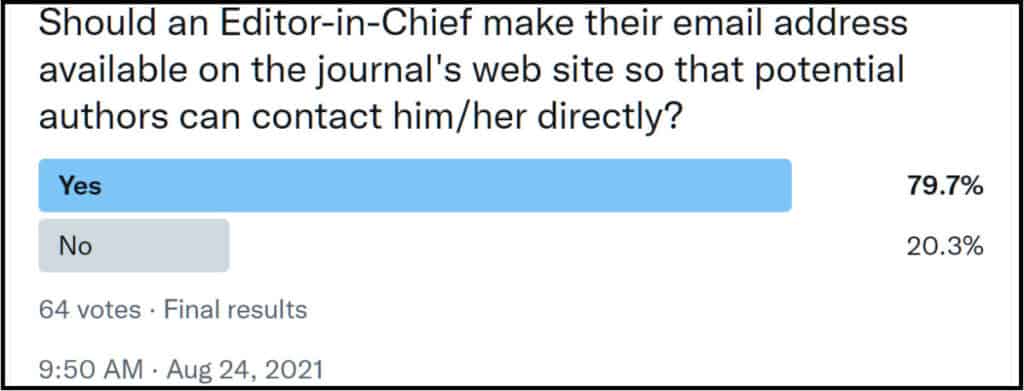
Caveats
In carrying out a survey such as this, we have to note a few caveats.
- The sample size (64) is not that large. Whether we could take this result as being representative of a much larger sample size, is open to question.
- Given that the survey is carried out on our Twitter account there will be bias in the results as our followers are likely to hold a different view to a more random sample of the population.
- We recognise that those that wish to participate in the survey are probably more likely to vote “Yes”, rather than “No”.
Our view
We ran this survey, rather than giving our views straight away, as we were genuinely interested in what others thought.
The results do not surprise us. We assumed that the majority would hold the view that you should be able to contact the EiC of a journal.
We also hold the view that the EiC should be contactable (but we did not vote). Indeed, we would go further than that and say that their email address should be their professional email address (e.g. their institution), rather than a generic ‘editor@THE_JOURNAL’ email address where you do not actually know where it is going and who is going to respond to it.
In our view, the editor-in-chief takes on the responsibility for the academic integrity of the journal. As such, (potential) authors should be able to reach out to them to check things like aims/scope, whether they believe that a review in unfair; indeed, anything to do with the journal of an editorial nature.
If that is denied and you either have to contact an editorial assistant, use a general ‘editor’ email or fill in a web based form, this would raise significant alarm bells for us.
This is not only so that you can contact the editor easily, but if you do not have an email address, it makes it more difficult to check their credibility or check whether they actually know that they are listed as the editor-in-chief.
As we said at the start of this article, not having an email address for the EiC, or any lack of details about the editorial board, is not a definitive indicator that the journal is predatory but it should raise a red flag that suggests that further due diligence should be done.
Please consider supporting us by becoming a patron

Thank you for reading this article. If you would like to support the work we do, please consider becoming one of our patrons.
With your support, it will enable us to deploy some of the ideas that we have, and will also enable us to work more closely together. As an example, we will look at journals and/or publishers that you propose. You can read more here.
